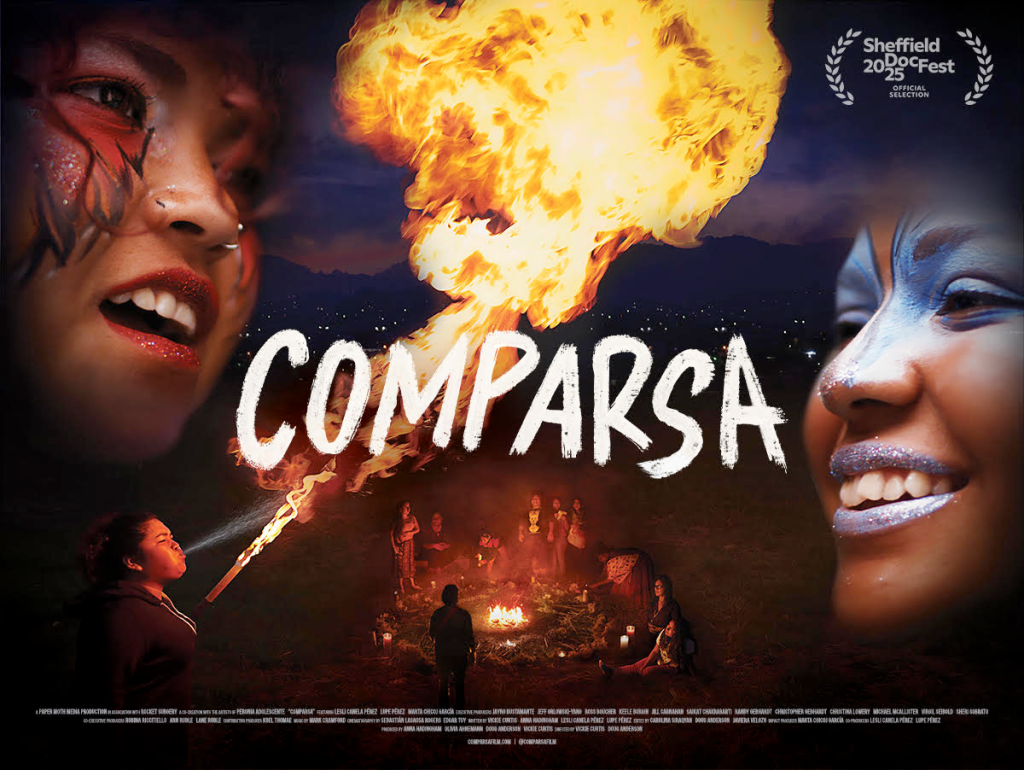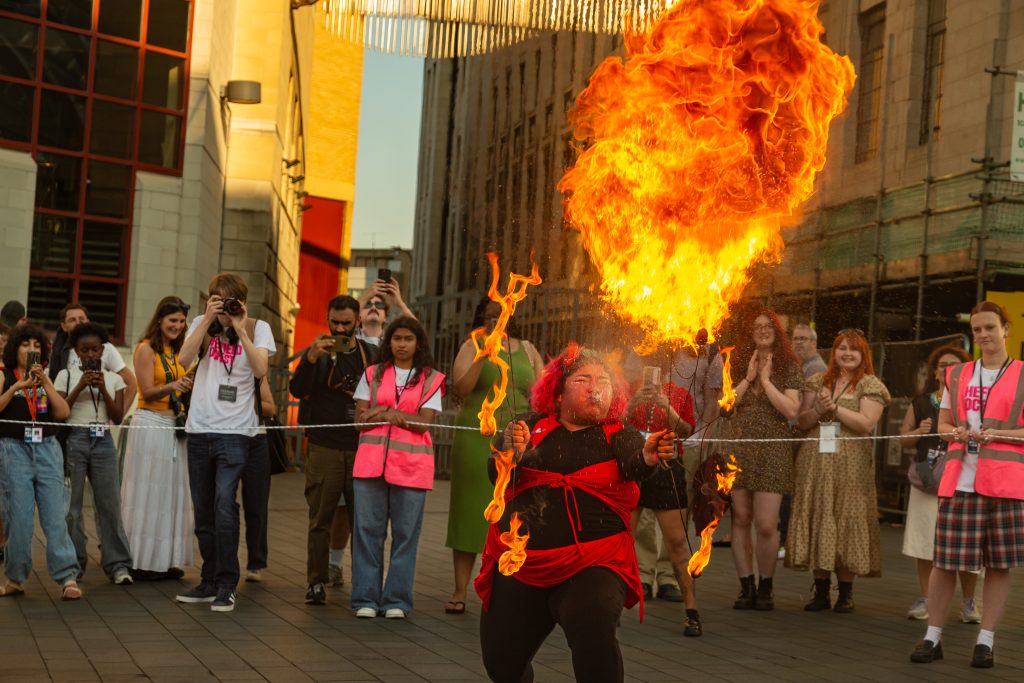
COMPARSA receives its World Premiere Saturday 21 June
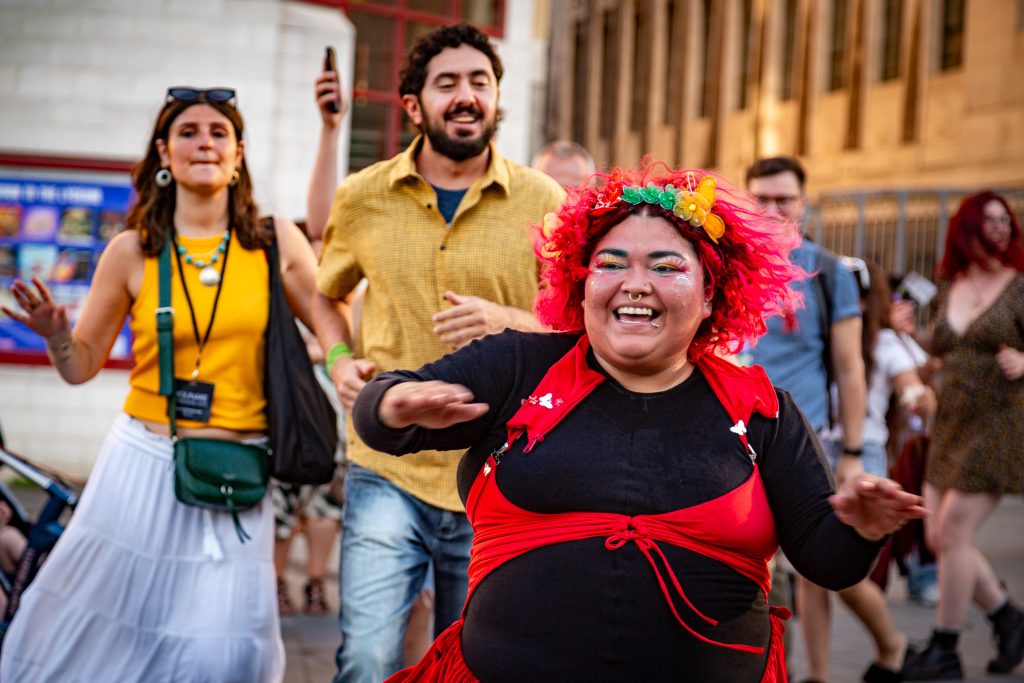
In celebration of the World Premiere of Comparsa at Sheffield DocFest, Guatemalan artists and documentary subjects Lupe Pérez and Lesli Canales Pérez were outside the Crucible in Tudor Square in the heart of Sheffield for body paint, fire performance, and street circus performance, accompanied by batucada beats from local musicians Stilt Batteristas.
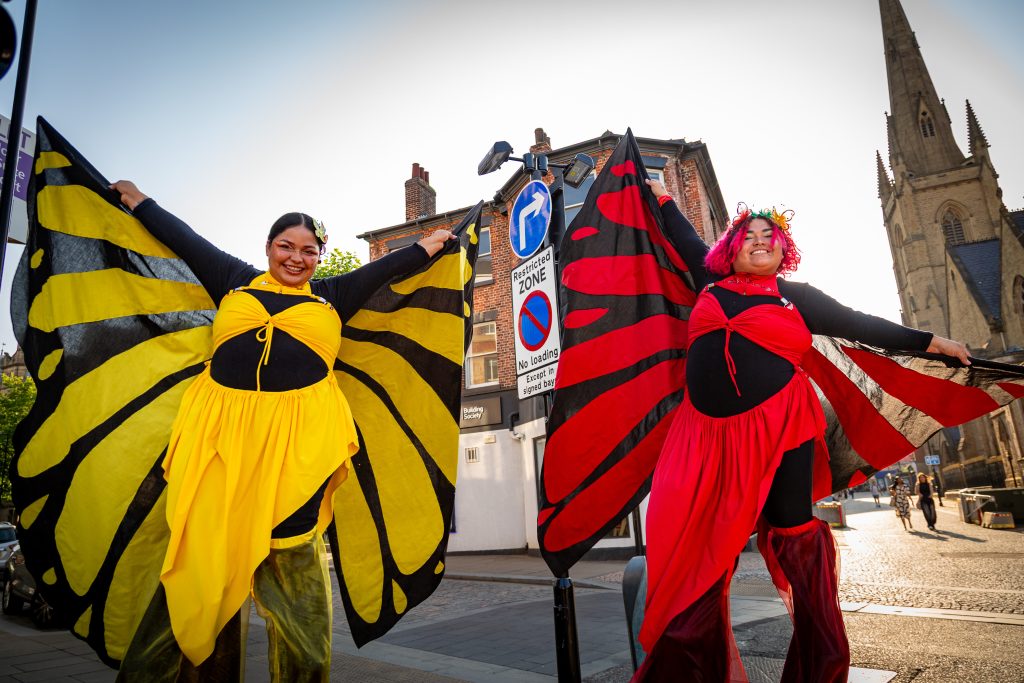
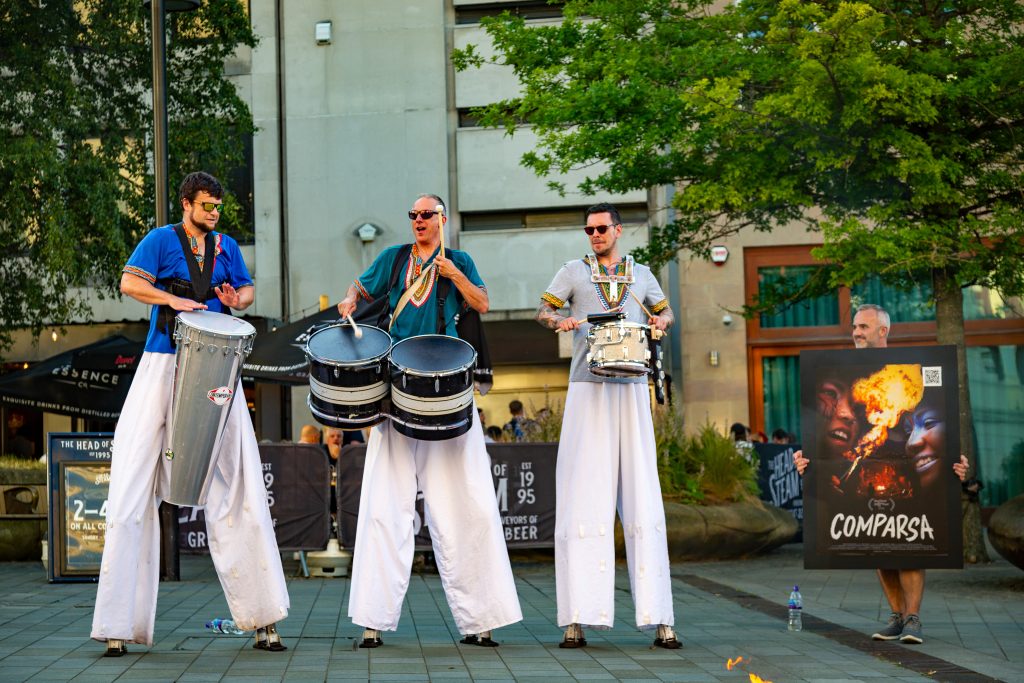
Comparsa will have its World Premiere at Sheffield DocFest on Saturday 21st June, 8:45pm at the Curzon cinema in Sheffield.
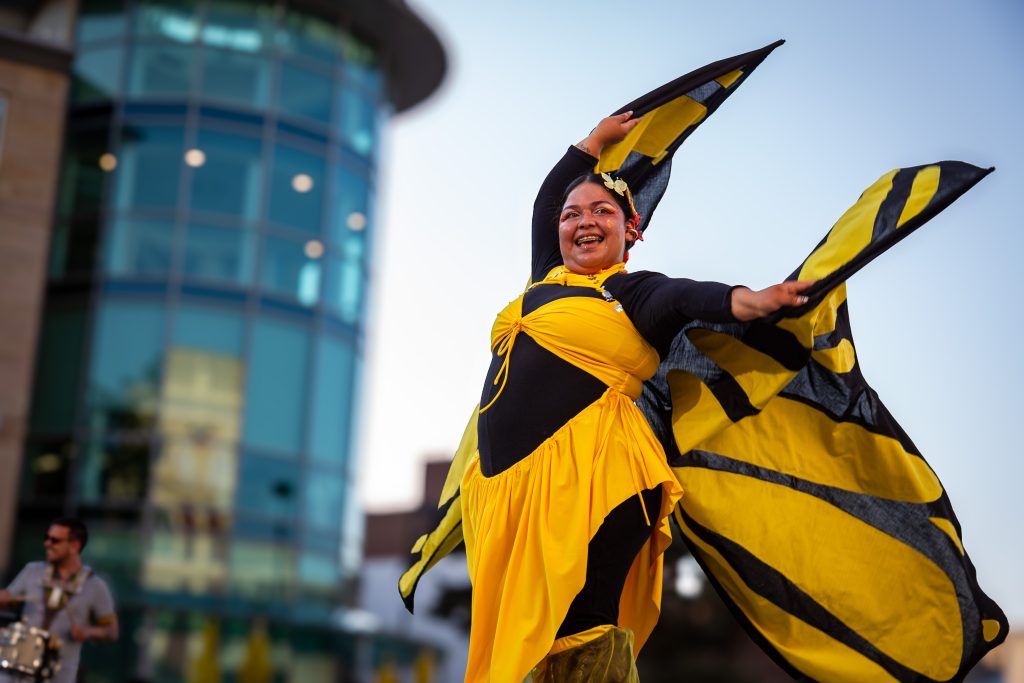
Logline: In a Guatemalan barrio silenced by fear, two teenage sisters lead a luminous rebellion—unleashing giant puppets, fire, and artful performance to protest gender violence in a joyful fight for survival.
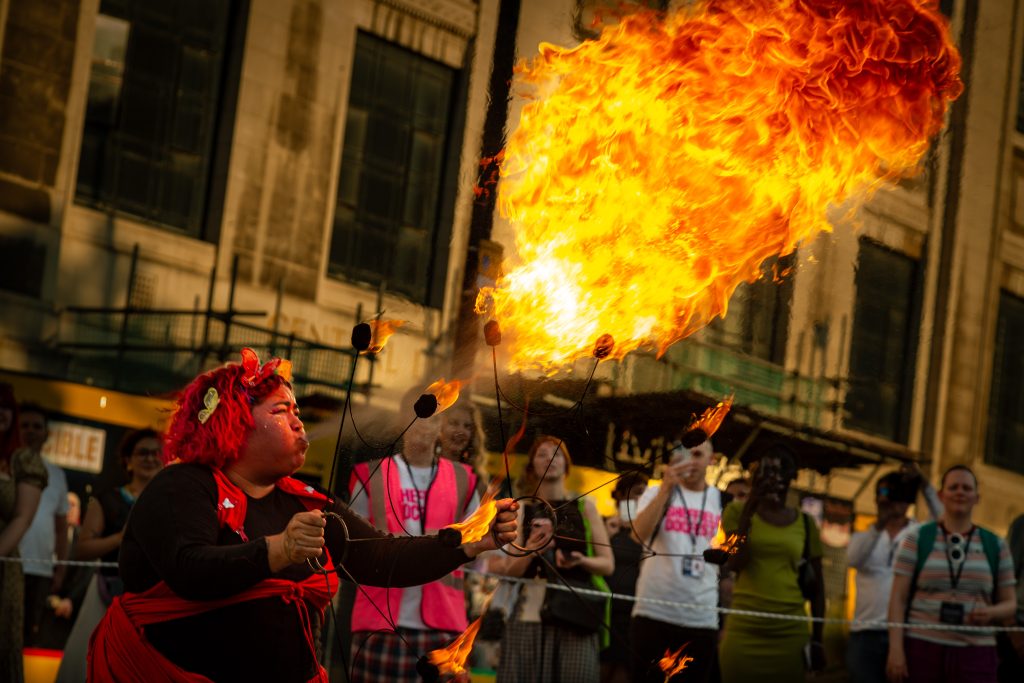
Synopsis: Comparsa fully immerses audiences in the intense world of Ciudad Peronia, Guatemala, where sisters Lesli and Lupe use art and performance to rally local youth and heal The Social Dilemma wounds. After 41 girls are killed in a State-run “Safe Home” and the government refuses to act, the sisters respond with a community comparsa—an exuberant street performance featuring towering puppets, fire-breathing stilt walkers, and thundering drums. With brave vulnerability, they expose a power structure that permits and commits violence against women, and they open up about surviving violence in their own home.
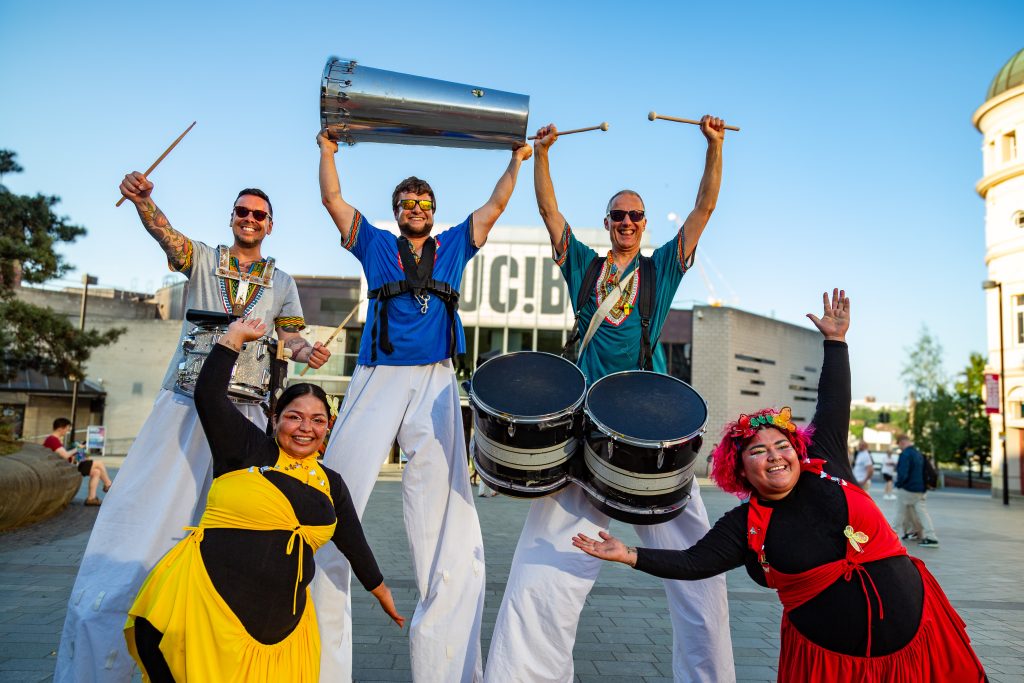
Their youth movement takes to the streets, confronting corruption and reclaiming public space for women and girls. Rooting their efforts in joy and community care, they find healing for themselves along the way.
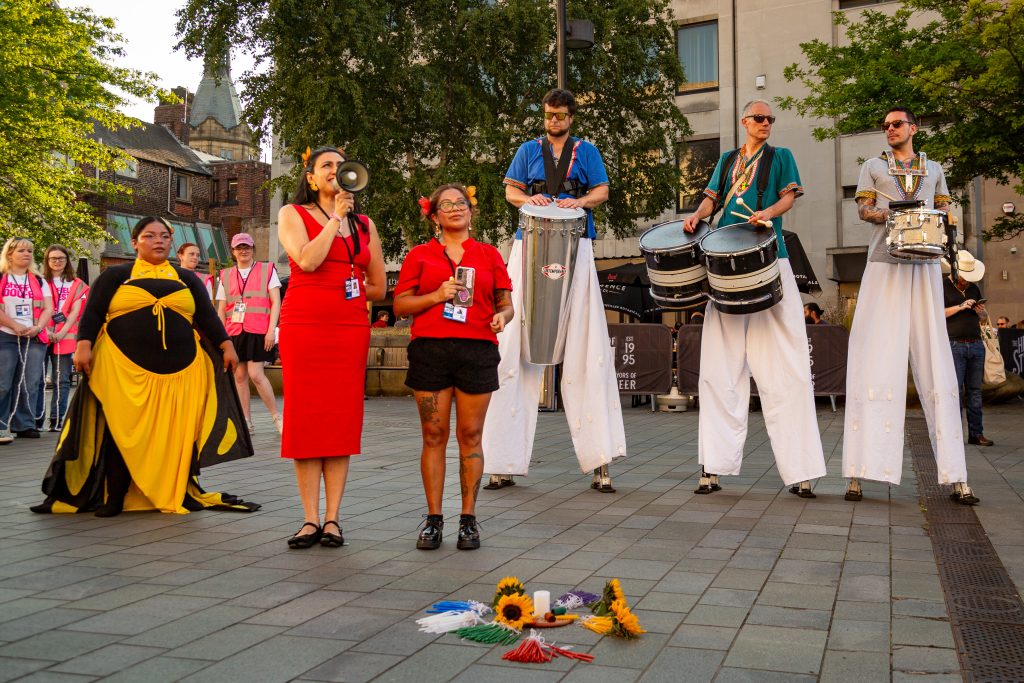
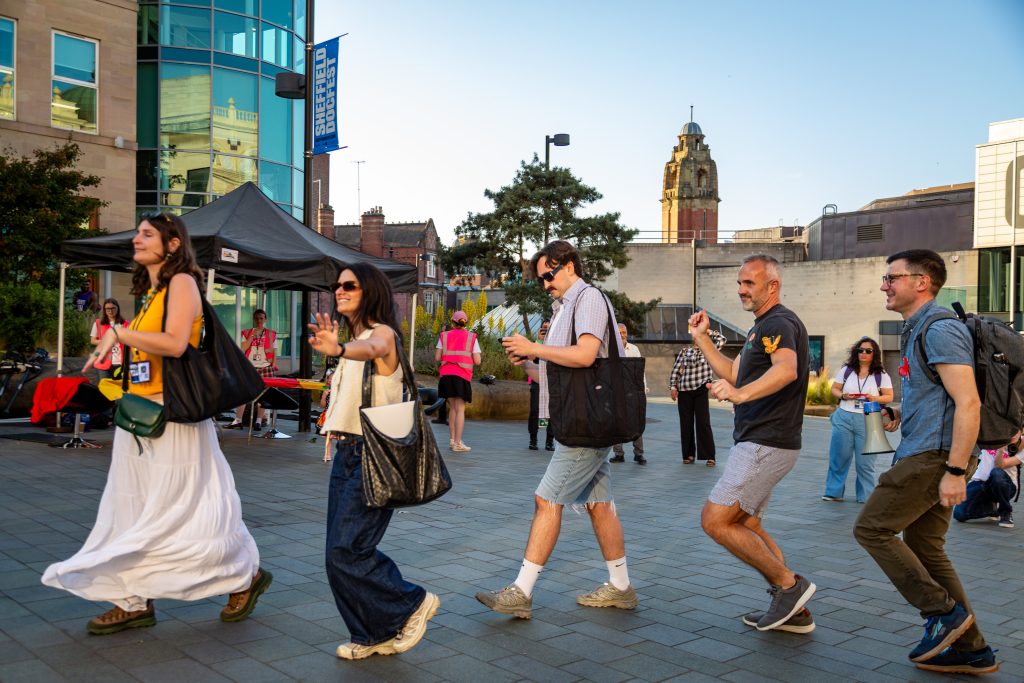
Comparsa is built on a 15-year relationship between the subjects and the film team to offer a stirring portrait of sisterhood, peacebuilding, and the transformational power of art.
Director, Vickie Curtis’s Statement
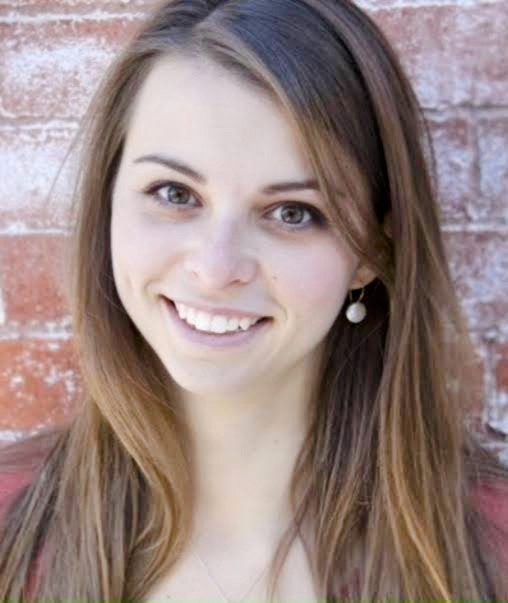
My lifelong fascination with characters and story structure was honed in the theatre and landed me in the world of documentary film writing. After a decade of writing films such as The Social Dilemma and Searching For Amani, I developed a craving for human-centered stories that could offer clues for addressing the pressing crises we face.
In Comparsa, I see young people finding a fundamentally different way to organize the community, prioritize wellbeing, heal, and rebuild together. To embody these values, I’m taking a deliberate, collaborative approach to making this film.
Comparsa is born from personal connection and a shared theory of change. My co-director Doug Anderson and I met decades ago, as kids in a youth theatre program that pushed us to question the status quo and embrace self-expression as resistance. During that program, we became fast friends with Comparsa’s producer, Anna Hadingham. Anna moved to Guatemala in 2007 and began working alongside our film’s subjects, learning to produce raucous public performances as a method for grassroots organizing.
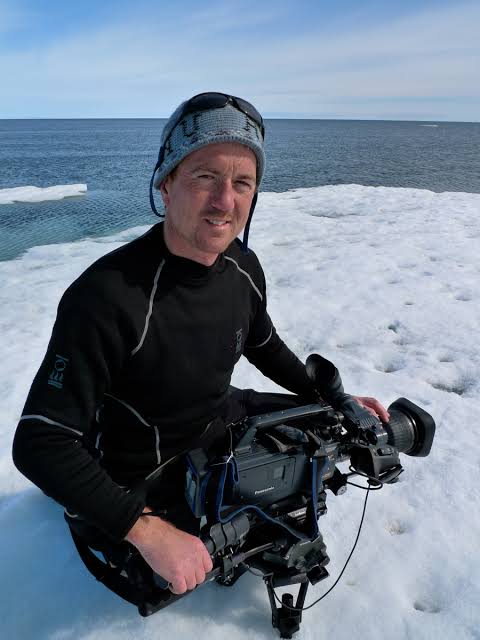
After nearly a decade of hearing about Anna’s exceptional artist collaborators in Guatemala, Doug and I decided to go to Peronia and see for ourselves.
Meeting Lesli and Lupe on our first day in Peronia led to a shared desire to illuminate the daily dangers so many young women face and the joyful, creative ways they’re driving change.
The film is being co-created by all of us, and in that spirit, we’ll share a translated note from one of the film’s writers and subjects, Lupe Pérez:
“Comparsa is a project by people who care deeply about one another and who believe that the work we are doing to empower youth in Ciudad Peronia should be shared. Telling my story has given me strength….It means a lot for us to be seen, to feel we have something to teach the world despite our circumstances.”
As a mostly women-led team of fellow theatre artists, with a groundwork of trust laid by Anna over the course of a decade, we developed intimate access with our teenage subjects as they grappled with personal trauma on one hand, and an unjust system on the
other.
Our intention is to draw audience members into the private worlds and the public demonstrations that make up daily life for Lesli, Lupe, and the other women in this story. Their candid presence on screen paints a picture of a place and of a time in life when belonging and purpose are everything. Finding that belonging and purpose with each other, they work to transcend the traumas of a racist, sexist, extractive system.
We mix vérité and interview moments with more ethereal sequences that highlight the magical, mythical nature of Lesli and Lupe’s art. Layered with passages of our characters’ original poetry, these sections underscore the surreal way life fluctuates between joy and sorrow,
and the way art braids meaning into experience.
We intend the substance and style of Comparsa to resonate with audiences that are hungry for a joyful model of change making. Unlike films about the developing world that stay mired in harsh problems or posit external solutions from foreign savior figures.
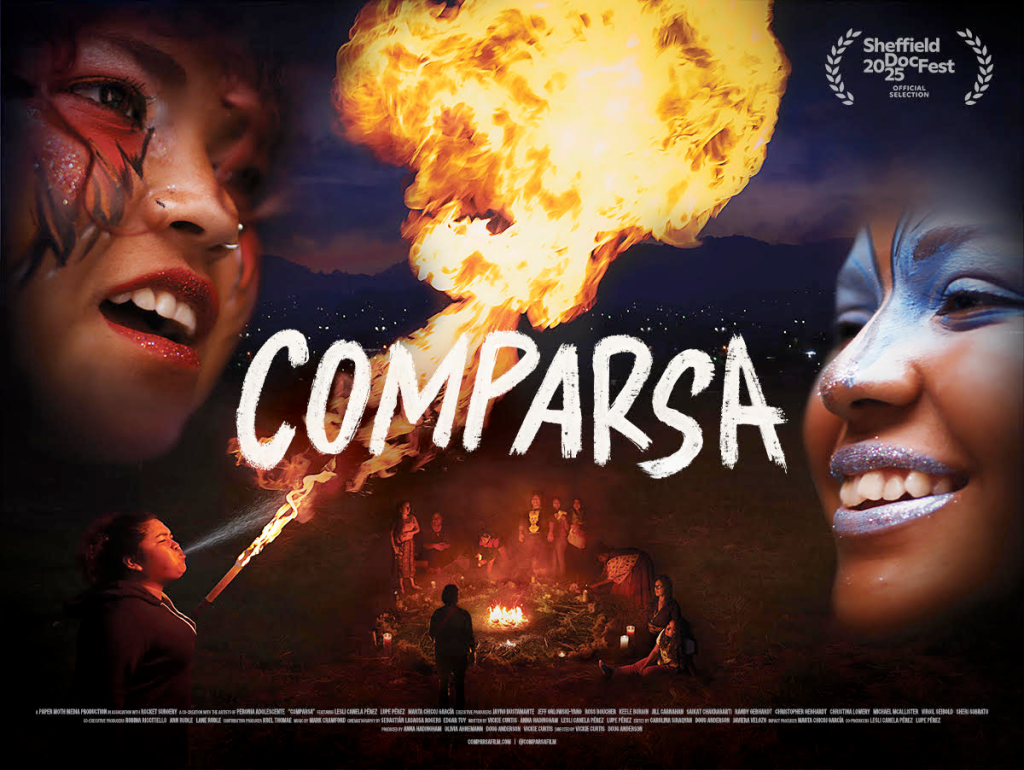
Comparsa highlights young people forging a better future through their own creative action. It serves as a narrative disruption to misleading portrayals of Central Americans and exemplifies strategies for speaking truth to power in a time when fascistic authoritarians are gaining ground around the globe. As the eldest sister in my own family, and as a mother to two daughters, I believe the time is now for women to organize, center their own joy, and fight for the humane systems we’re already beginning to build.
REVERSING A LEGACY OF FEMICIDE
THE FIRE
At the center of Lesli and Lupe’s efforts to empower women and girls is a notorious act of violence that plagues their community. The incident claimed the lives of their childhood friend Siona, along with 40 other girls residing in a government-run Safe Home.
The Safe Home was intended as a refuge for girls with unstable family lives, but it is now clear that the State-run facility was anything but safe.
On March 7th, 2017, dozens of residents broke out of the Safe Home, protesting bad treatment and abuse, including alleged human trafficking and sexual assault. That night,police rounded up many of the escaped girls and locked them in a makeshift dormitory back at the Safe Home. The next morning, the captive girls asked to be let out of the cramped room to use the bathroom. The police and Safe Home guards denied their request.
One girl started a fire. The girls begged for the guards and police to unlock the door as the fire engulfed them, but the police refused.
The guards and police left all 56 girls in the room to burn for nine minutes; 41 of them were killed, and the 15 survivors suffered severe burns and untold trauma. This event has become iconic of the lack of care, respect, and rights given to women and girls in Guatemala and beyond.
For Lesli and Lupe, it includes the personal loss of a close childhood friend. Lesli and Lupe come from the same streets as the girls who died, and they are well aware that it could have been them locked in that burning room, lungs on fire.
In approaching this story, our intention first and foremost has been to honor the girls who died in the fire and fight for the girls who remain in harm’s way. Our subjects transform their pain into purpose; rising as leaders of a youth movement, insisting on the safety,dignity, freedom, and joy of girls everywhere.
THE FIGHT
● In April 2024, the IACHR highlighted the deterioration of Guatemala’s democratic systems. Lesli and Lupe’s joyful, art-driven methods offer a fresh way to engage and build peace.
● Guatemala has one of the highest rates of femicide globally, and a staggering 71%of those cases go unsolved. Lesli, Lupe, and their mentor Marta are working to create more safe spaces for women and girls in Guatemala—spaces where artistic expression, body autonomy, joy, and mutual aid are the norm. We endeavor to support that effort.
● Lesli and Lupe realize this fight is not a sprint, but a relay race. They prioritize bringing a new generation of young women into the fold. Their chosen slogan for the comparsa and womens festival featured in the film is: Somos las semillas quetrascienden desde las cenizas – We are the seeds that rise from the ashes.
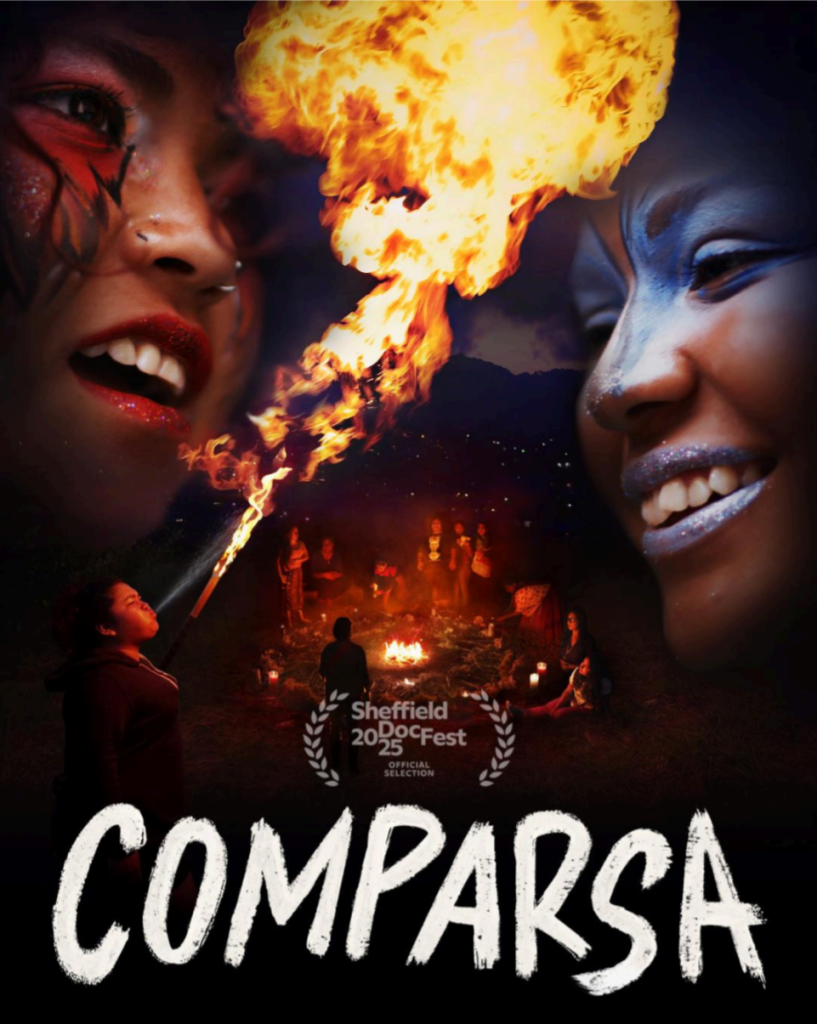
ABOUT THE TEAM
Vickie Curtis (director, producer, writer)
Emmy-winning writer of Netflix Originals The Social Dilemma and Chasing Coral, Vickie makes her directorial debut with Comparsa. Her work explores the systemic roots of social and ecological crises, and the artists and activists working to rebuild. Vickie’s storytelling spans award-winning documentaries including Searching For Amani (Tribeca), We Are Guardians (HotDocs, Netflix LatAm), Greener Pastures (POV), and Anbessa (Berlinale, Arte). After years studying theatre and education, she brings a collaborative ethos to each project.
Doug Anderson (director, editor, producer)
Doug is a New York-based filmmaker and founder of Paper Moth Media, where he create politically engaged documentary work, including for the groundbreaking 2018 campaign of US Representative Alexandria Ocasio-Cortez. Credits include cinematography for To The End (Sundance 2022) and The Providers (Independent Lens), and sound work on Predators (MTV Documentary Films), Knock Down the House (Netflix) and Pride (FX). Comparsa marks his directorial debut.
Anna Hadingham (producer, writer)
A theater artist and youth advocate, Anna spent a decade working alongside Guatemalan youth in Ciudad Peronia on arts-based youth development initiatives. As a Peronia Adolescente collaborator, she co-created performances to organize the community and facilitate healing. She serves as community liaison and impact producer on the Comparsa film team. Anna has also served as director of youth programs at La Colaborativa, a non-profit organization run by and for the immigrant community in Chelsea, Massachusetts. She continues collaborations with Peronia Adolescente, rooting her workin community, justice, and imagination.
Olivia Ahnemann (producer)
An Oscar-nominated producer (Porcelain War, Sundance 2024 Grand Jury Prize), Olivia has over two decades of experience crafting bold, impactful documentaries. Her credits include Youth v Gov (Netflix), Under the Gun (Sundance), Racing Extinction (Discovery), and The Cove, which won the Academy Award for Best Documentary. She is known for championing character-driven films that illuminate global crises.
Edgar Tuy (cinematographer)
Tuy is a Kaqchikel Mayan filmmaker born in Sololá, Guatemala, who migrated at an early age to Ciudad Peronia, where he began a career in the visual arts. Tuy has studied cinematography in El Salvador and at Casa Comal in Guatemala. He has worked on feature and short films, national and international documentaries, music videos, and Kaqchikel translation of Netflix films. He is currently presenting his short documentary, Regalito de Dios and is in production on his next documentary, Mónica, a film about an indigenous trans woman fighting for human rights in her rural community.
Sebastián Lasaosa Rogers (cinematographer)
Sebastián was a Spanish-American documentary filmmaker based in Brooklyn, New York.A gifted and prolific cinematographer, he brought heart and visual poetry to numerous feature-length documentaries, including The Art of Making It, which won the Audience Award at SXSW 2022. In 2024, he made his directorial debut with Freeing Juanita, a powerful and personal film that premiered at DocsMX and continues to travel the international festival circuit. Sebastián’s work was marked by a deep commitment to justice, beauty, and human connection. He is profoundly missed.
Press Contact:
Elizabeth Taylor | etaylor@christelleandcopr.com

